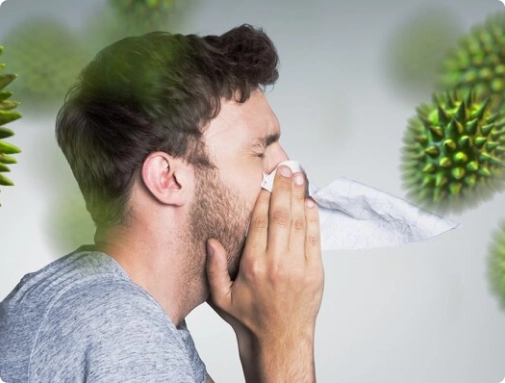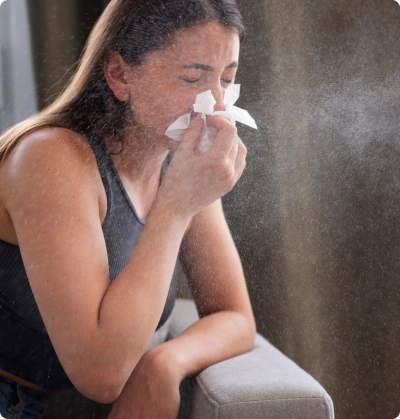Allergy Treatment Services
Expert Telehealth for Allergy Relief at Your Fingertips
Allergies occur when the immune system overreacts to substances that are typically harmless, such as pollen, dust mites, or certain foods. This hypersensitive response can lead to a wide range of symptoms, from mild discomfort to severe, life-threatening reactions. Allergies can affect individuals of all ages and may develop or change over time, sometimes becoming more severe. With expert telehealth services, allergy relief is just a click away.

Common Allergies We Address
Seasonal Allergies (Allergic Rhinitis)
Seasonal allergies are commonly triggered by pollen from trees, grasses, and weeds, causing symptoms like sneezing, nasal congestion, itchy eyes, and a runny nose. This form of allergic rhinitis is especially prevalent during certain times of the year and can significantly impact daily activities.
Food Allergies
Food allergies are a common and serious concern, with reactions to foods like peanuts, tree nuts, shellfish, milk, and eggs being the most frequent triggers. Symptoms range from mild hives or itching to life-threatening anaphylaxis. Early diagnosis and management are key to preventing severe reactions.
Insect Sting Allergies
Allergic responses to bee or wasp stings can lead to localized swelling, hives, and, in severe cases, systemic reactions such as anaphylaxis. Immediate medical attention is often required, especially for individuals who experience severe swelling or breathing difficulties after a sting.
Pet Allergies
Pet allergies, commonly triggered by proteins in pet dander, saliva, or urine, result in respiratory symptoms such as sneezing, runny nose, and itchy eyes. In some cases, exposure to pet allergens can also exacerbate asthma symptoms, especially in individuals with pre-existing conditions.
Mold Allergies
Exposure to mold spores, particularly in damp indoor environments, can trigger symptoms such as nasal congestion, coughing, and eye irritation. Mold-related allergies are common in areas with high humidity or poorly ventilated spaces.
Dust Mite Allergies
Dust mites are microscopic organisms that thrive in household dust and can trigger sneezing, a runny nose, itchy eyes, and asthma-like symptoms. These allergens are particularly problematic in bedding, upholstered furniture, and carpets.
Recognizing Symptoms of Allergic Reactions
Symptoms can vary based on the type of allergen but typically include:
- Sneezing
- Runny or stuffy nose
- Itchy, watery eyes
- Skin rashes or hives
- Swelling of the lips, tongue, or throat
- Shortness of breath or wheezing
- Digestive issues: nausea, diarrhea, or vomiting
- Fatigue or general malaise
If any of these symptoms interfere with daily activities or worsen over time, it’s essential to seek medical advice.

Our Telehealth Approach for Allergy Management
- Same-Day Virtual Appointments:
Get prompt care without the wait. We offer same-day appointments to evaluate your symptoms and recommend a treatment plan tailored to your needs.
- Electronic Prescriptions:
If medication is required, prescriptions are sent directly to your preferred pharmacy for quick and easy pickup.
- Personalized Management Plans:
Your treatment plan is customized based on your unique allergy triggers, symptoms, and lifestyle. We work with you to find the best solution for long-term relief.
- Education on Allergen Avoidance:
We provide expert advice on how to avoid common allergens and reduce exposure at home, work, and while traveling.
Preventing Allergic Reactions
Effective allergy prevention involves both proactive management and lifestyle adjustments:
Identify Triggers:Work with your healthcare provider to determine your specific allergens through testing. This step is crucial for managing symptoms and preventing flare-ups.
Avoid Exposure:Once triggers are identified, take steps to avoid them. This might include staying indoors during high pollen seasons, using dust-mite covers for bedding, or keeping pets out of certain areas.
Maintain Clean Environments:Regular cleaning helps reduce allergens. Vacuum carpets, wash bedding frequently, and use air purifiers to minimize allergens in your home.
Monitor Pollen Counts:If you have seasonal allergies, staying informed about local pollen levels helps you plan outdoor activities and manage exposure
Carry Emergency Medication:Always have antihistamines, nasal sprays, or epinephrine auto-injectors on hand, especially if you’re prone to severe allergic reactions.
When to Seek Immediate Care
- Difficulty breathing or wheezing
- Swelling of the face, lips, or throat
- Rapid heartbeat or palpitations
- Dizziness or fainting
- Severe drop in blood pressure
- Loss of consciousness or confusion
These could indicate anaphylaxis or another severe allergic reaction that requires urgent medical attention.
Schedule a Telehealth Appointment
If you’re experiencing allergy symptoms or have concerns about your health, don’t hesitate to reach out. Our telehealth services offer prompt and effective care, ensuring you get the right treatment at the right time, without leaving home.
